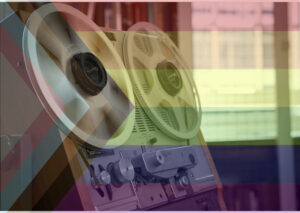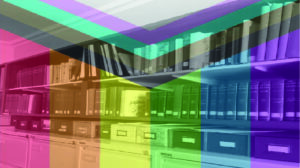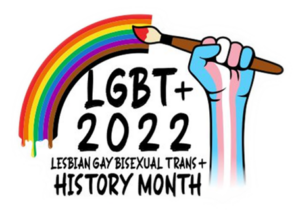This year saw the development of the Queering the Archive initiative as part of our 70th Anniversary.
Join Elliot as he takes you through an exploration of the initiative as well as updates and upcoming plans.
Queering the Archive was designed to use tools of Queer Theory to investigate our collections and improve representation. It aims to consider wider issues of LGBTQ+ and intersectional
representation in our own collections and improve gaps by researching our records
and collection bias, and to focus on actively working with the LGBTQ+ community for input to
improve these gaps and provide ways forward. It also aims to improve representation and working
collaboratively by moving towards active archiving.
“The term “queer theory” itself came from Teresa de Lauretis’ 1991 work in the feminist cultural studies journal differences titled “Queer Theory: Lesbian and Gay Sexualities.” She explains her term to signify that there are at least three interrelated projects at play within this theory: refusing heterosexuality as the benchmark for sexual formations, a challenge to the belief that lesbian and gay studies is one single entity, and a strong focus on the multiple ways that race shapes sexual bias. De Lauretis proposes that queer theory could represent all of these critiques together and make it possible to rethink everything about sexuality.” Queer Theory: Background, Illinois Library
Originally, it was inspired by my attendance of the Queer Heritage and Collections Network symposium and thinking of ways forward for LGBT+ representation within our own collections. I brought ideas to the team which led to some brilliant staff discussions on collections and ways forward for diversity and inclusion in collections and archiving. This then led to planning and developing the stages for Queering the Archive.
The first stage was researching the gaps in collections, looking at what we hold and do not hold on LGBTQ+ content, and creating a working list of records of or related to LGBTQ+ topics.
The next stage was developing a staff workshop to introduce colleagues to my findings and open conversation up further about what we can do as professionals for representation. The workshop was really valuable for learning from eachother and having open conversation on the work we have done and ways forward for diversity and inclusion in archival and museum collections. After this workshop, I ran a wider public workshop for members of the LGBTQ+ community. The workshops began with a presentation of the initiative, findings, and plans. It was split into two sections – Discussion and Intervention. The first section involved group discussion of representation within our archive and across the Galleries, Libraries, Archives, and Museum sector. The second section focused on creating search-terms and tags that are relevant to the LGBTQ+ community to improve our catalogues.
The next steps were outreach and engagement with those who identify as LGBTQ+ through the podcasts featured on this blog. This stage is a continuing process, and while there are still plenty more to come out on the blog I am always looking for individuals or organisations to talk to and would love for people to conduct their own podcasts and oral history interviews to be deposited with us.
Earlier this month, we ran a workshop with An Comann Ceilteach, the University of Edinburgh’s Highland Society, on ‘Using Archival Records Creatively’. We at SSSA very much encourage research and use of our archival collections. This workshop aimed to encourage students in understanding access and copyright and the many ways you can research and use records creatively. We are hoping to run another online creative workshop early in 2022 to begin our plans for LGBTQ+ History Month.
The future of Queering the Archive rests on active archiving of intersectional records. We very much want to have a range of voices and works within the sound collection and beyond, and even if you do not identify as LGBTQ+ we encourage all students and the public to deposit with us and get involved in initiatives and our work.
For LGBTQ+ History Month, we wish to hold an online digital exhibition via our blog of new deposits and encourage creative uses of records and call-outs for new material. So, if you are interested in creating or researching queer histories and folklore and want to get involved, please just get in touch. This can be responses to records or original works of audio-visual material, oral history fieldwork and recordings, manuscripts, essays, digital artworks, and more.
Perhaps you want to recreate a tale or folklore, or create something new inspired by collections? Or you may wish to recreate love songs and ballads with a queer twist, or conduct your own oral history interviews? There are many possibilities.
To help you with this, we will run workshops and you can also access our new Research Guide to LGBTQ+ Records and Resources at the School of Scottish Studies Archives. The guide is available to all. Staff and students can access the guide via the Queering the Archive sharepoint. It is also available by request to us at scottish.studies.archives@ed.ac.uk
The guide takes you through everything about Queering the Archive, a list of all of our LGBTQ+ records that are accessible remotely, and updated terminology from the Homosaurus. The record listing can help you get started with creative responses and research.
It really has been an exciting year for the initiative and we hope you would like to get involved with taking things further for History Month and beyond.
Follow us on Twitter for further updates on Queering the Archive and our work at SSSA.



